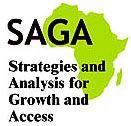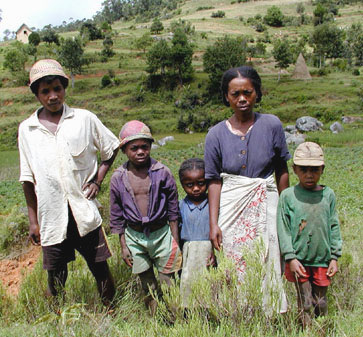|
|
|
||
In the fall of 2001, CFNPP faculty as principal investigators, together with other Cornell faculty, initiated SAGA (Strategies and Analyses for Growth and Access), a six-year, $8 million, USAID-sponsored project for research and technical assistance in Africa, in collaboration with Clark-Atlanta University. The research focused on four major structural constraints that hold back the African poor: (1) education, (2) health and nutrition, (3) risk, vulnerability and poverty dynamics, and (4) empowerment and institutions. The technical assistance component of SAGA included grant proposal preparation and review, training courses or workshops on specific topics or methods, and communication and outreach strategies that maximized the probability that research would have an impact on policy. The SAGA project also provided grant support for US-based PhD students and faculty in economics, agricultural economics, and other closely related fields to be carried out in selected African countries. |
 |
|
CFNPP also has a large collaborative project with the African Economic Research Consortium to provide training and engage in collaborative research on poverty, labor markets and human resource development with African scholars. |
||
 |
In Madagascar, CFNPP was involved in a three-year USAID-sponsored project, "Improved Economic Analysis for Decision-Making." CFNPP researchers have partnered with local institutions to conduct collaborative analysis on issues important for economic policy and poverty reduction, and to disseminate these analyses and facilitate public dialogue, policy debates, and decision-making. Cornell worked in Madagascar with PACT, on the joint endeavor, the ILO Project, to improve the policy process in Madagascar through improved economic analysis, and through the expansion of availability and use of such information to enhance policy dialogue. |
Other research activities have focused upon:
|
 The Razanamaro family is a poor, female-headed household in Tsararivotra, in Fianarantsoa province in Madagascar’s southern highlands. SAGA researchers study how policy can most effectively help poor, rural households like Mlle. Razanamaro’s, who are dependent on unskilled labor and rainfed, traditional crop cultivation along fragile forest margins and seem trapped in a self-perpetuating cycle of poverty and environmental degradation. |
||
CFNPP-sponsored graduate training includes courses on analysis of global hunger and malnutrition, empirical methods for the analysis of household survey data, and economic policy development; advice on theses research; and graduate student assistantships. In addition, CFNPP publishes books, journal articles and book chapters, and working papers that are disseminated widely throughout the world. Additionally, CFNPP staff are regularly engaged in organizing, and participating in training seminars and workshops to further disseminate research results and to help ensure their integration into policy decision-making processes. The majority of CFNPP’s activities are funded by external donors. |
|||
|
CFNPP Home | Personnel | Contact CFNPP | Links | Search | Books | Monographs | Working Papers (ISSN 1936-5071) | Reprints © 2022, 2021–2003Site maintained by Patti Mason CORNELL FOOD AND NUTRITION POLICY PROGRAM |